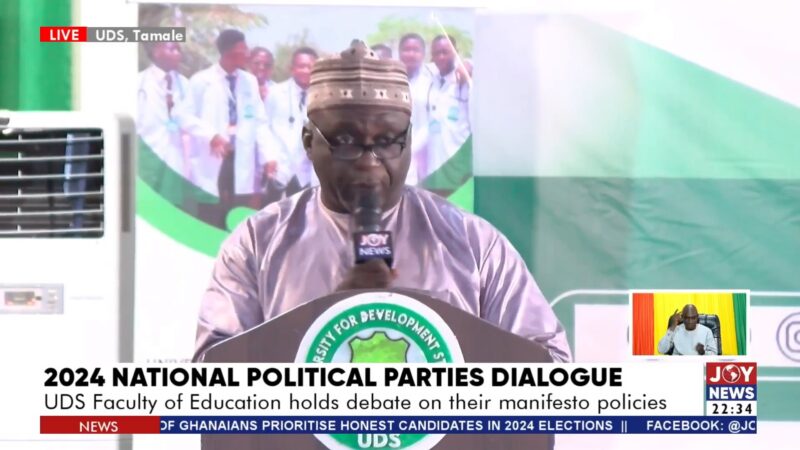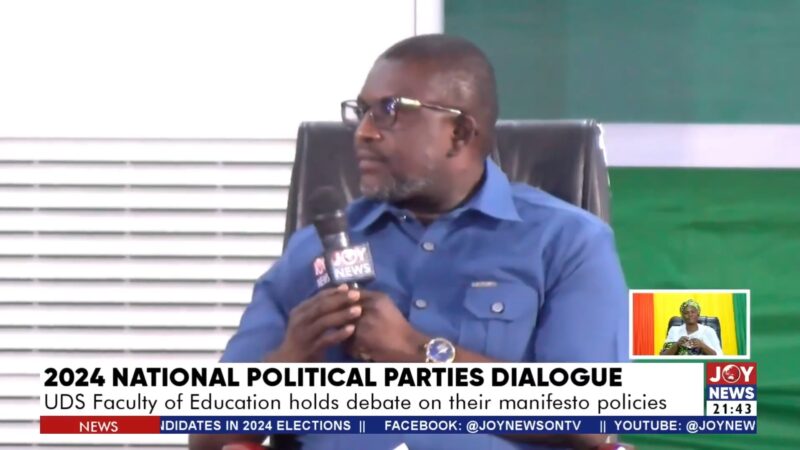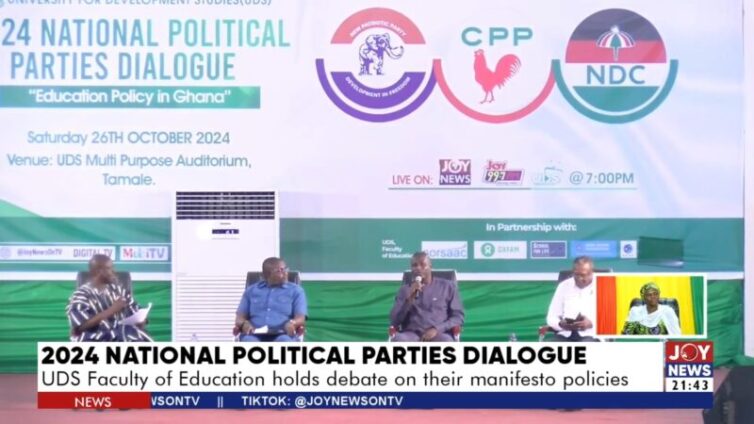The University for Development Studies (UDS), through its Center for Educational Innovation and Leadership (CEIL) under the Faculty of Education (FoE), hosted the second edition of the Political Dialogue on Education Policy in Ghana.
Held on October 26, this pivotal event gathered political representatives, educational stakeholders, and the public to debate key educational policies in the lead-up to Ghana’s 2024 general elections.
The dialogue, organized in collaboration with Oxfam, NORSAAC, Star Ghana Foundation, School for Life, and RAINS, was centered around pressing issues within the Ghanaian educational system, with a focus on the Free Senior High School (Free SHS) policy.
UDS Emphasises Practical Education Through Dialogue
UDS, known for its commitment to practical, community-oriented education, underscored the dialogue's importance as a platform for fostering informed discourse.

Prof. Ibrahim M. Gunu, Dean of the Faculty of Education at UDS, highlighted the university’s dedication to nurturing critical thinking and active engagement with national issues, noting, “We believe that an informed populace is essential for a thriving democracy, and UDS is committed to being at the forefront of national dialogues on education.”

He stressed that the event was designed to allow political parties to present, reflect on, and engage with the educational policies articulated in their manifestos, especially as they relate to the Free SHS initiative and other education policy issues.
The Principal of Nyankpala Campus, Prof. Muniru Iddrisu, who represented Vice-Chancellor Prof. Seidu Al-hassan, expressed gratitude to the Faculty of Education for leading the initiative, describing it as “a commendable step towards fostering a well-informed electorate.”

Sponsors Call for Continued Discourse on Education
The event’s sponsors also emphasized the value of such national dialogues. NORSAAC, Executive Director Mr. Mohammed Awal applauded UDS’s effort, remarking, “We are honored to contribute to such a crucial national conversation on education. Our hope is that these dialogues continue to enrich policy discussions and lead to tangible improvements in the education sector.”
Divergent Party Perspectives on Free Senior High School Education
The New Patriotic Party (NPP), represented by Dr. Kwabena Bempah Tandoh, reaffirmed its commitment to the Free SHS policy, which it originally introduced. Dr. Tandoh defended the policy as a transformative force, arguing, “Free SHS has made quality secondary education accessible to thousands of students who would otherwise be left behind. We view it as an investment in Ghana’s future.” He acknowledged some operational challenges but emphasized that the NPP remains committed to expanding and improving the programme.

On the other hand, the National Democratic Congress (NDC), represented by Dr. Clement Abas Apaak, MP for Builsa South, presented a more cautious view. While supporting free access to education, Dr. Apaak criticized the current implementation, saying, “The Free SHS policy in its current form is unsustainable and lacks adequate funding. Our approach would be to review and refine the policy to ensure that it meets quality standards and is inclusive.”
He called for a more efficient funding structure and the inclusion of stakeholders, including parents and educators, in shaping the future of the programme.

The Convention People’s Party (CPP), represented by Bono Regional Chairman Mr. Ali Dayinday, advocated for an approach that emphasizes inclusivity and resource allocation to rural schools. Dayinday noted, “While Free SHS is an admirable goal, we must ensure that every region has equal access to quality education. The CPP is committed to bridging the resource gap, especially in underserved areas.”
His remarks underscored the CPP's priority of regional equity in educational resources and opportunities.

A Platform for Engagement and Reflection
The event’s dialogue extended beyond the Free SHS policy, touching on critical topics such as the welfare of students, education funding, and inclusivity.
The three participating parties, representing diverse political ideologies, provided insights into how they intend to handle these issues within the broader education sector.
The dialogue, attended by educational stakeholders, faculty, students, and members of the public, presented an invaluable opportunity for direct engagement with the nation’s political leaders.
As the country approaches the general elections, this dialogue has set the stage for continued discussions on the future of education in Ghana. It remains a testament to UDS’s commitment to practical education and its dedication to fostering an informed and active citizenry.
Latest Stories
-
‘Expired’ rice scandal: FDA is complicit; top officials must be fired – Ablakwa
31 mins -
#TheManifestoDebate: We’ll provide potable water, expand water distribution network – NDC
49 mins -
IPR Ghana@50: Pupils educated to keep the environment clean
55 mins -
PenTrust CEO named ‘Best Pensions CEO’, company wins ‘Scheme Administrator Award’ at Ghana Accountancy & Finance Awards 2024
1 hour -
Alan Kyerematen’s ‘Brighter Future for Health Professionals’ in Ghana Revealed in Bono
1 hour -
#TheManifestoDebate: NPP will ensure a safer, cleaner and greener environment – Dr Kokofu
2 hours -
2024 Election: Police to deal with individuals who will cause trouble – IGP
2 hours -
Seychelles President’s visit rekindles historical and diplomatic ties with Ghana
2 hours -
Election 2024: EC destroys defective ballot papers for Ahafo and Volta regions
2 hours -
2024 Election: I am sad EC disqualified me, but I endorse CPP’s candidate – PNP’s Nabla
2 hours -
I want to build a modern, inclusive country anchored by systems and data – Bawumia to CSOs
2 hours -
Miss Health Ghana 2024: Kujori Esther Cachana crowned new Health Ambassador
2 hours -
Playback: The manifesto debate on WASH and climate change
3 hours -
Alan Kyerematen saddened by NDC and NPP’s neglect of Krofrom Market in the Ashanti Region
3 hours -
CSIR Executive Director urges farmers to adopt technology for improved farming
3 hours

